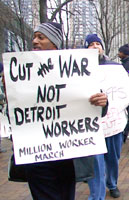Detroit city workers resist layoffs
By
Cheryl LaBash
Detroit
Published Feb 13, 2005 7:04 PM
Bus drivers in uniform and
workers from Water and other city departments picketed the Coleman A. Young
Municipal Building after work on Feb. 2. Stretching along Woodward Avenue, the
demonstration drew supportive horn honks from rush-hour drivers. Upstairs in the
City Council chambers, a 4-4 tie stalled approval of a plan to authorize $1.2
billion in bonds to fully fund Detroit's two pension systems.
|
One week of the war
budget would more than
fix Detroit's budget crisis.
|
A written
statement issued by four Council members explained their "no" vote. "A more
rigorous analysis of our budget situation can yield alternative solutions to
preserve jobs that do not depend upon this deficit financing tool. At a time
when we face an uncertain future because of a volatile stock market, a federal
deficit estimated in the trillions of dollars, and a protracted costly,
disastrous war, we should not gamble on a 15-year financing plan that is
predicated upon promises of a stable stock market."
However, under the
threat of 2,000 immediate layoffs in addition to 686 layoffs already announced,
the four relented. Two days after the protest, a unanimous City Council approval
was traded for a "no additional layoffs" pledge from the mayor for this fiscal
year. The agreement reportedly also includes freezing the city's purchase of
real estate and nonessential items. The layoffs already announced were not
rolled back.
Council may have agreed to the pension bonds, but this is
only one part of the squeeze on Detroit city workers and residents. Calling for
"equality of sacrifice," Mayor Kwame M. Kilpatrick announced an across-the-board
10-percent pay cut or an equivalent amount of time off without pay--called
DO-WOP days. The union con tracts expire on June 30. Pay cuts,
lay offs,
health benefit and pension changes will undoubtedly be put on the table by the
city during the union contract negotiations.
A City Council public
hearing on the effects of service cuts is scheduled for Feb. 14. City workers
will picket the mayor's Community Budget meetings on Feb. 8 and 10.
Clearly, a 10-percent cut in the six-figure salaries of the top city
administrators does not represent a sacrifice equivalent to 10 percent of a
typist's $20,000. But the big bonanza was left out of the plan
altogether.
What about a 10-percent cut in the city's interest payments to
the banks? The largest seven capitalist countries have recommended outright
canceling the debt of the 17 poorest countries, which is unrecoverable anyway.
Certainly the debt of the poorest countries should be cancelled, but what about
Detroit? Can't the banks contribute even 10 percent?
To fight the cuts,
working and unemployed people in this city must consider what is not being
mentioned. For example, the military budget will reportedly increase by 5
percent. Eliminate just one week of the cost of the military occupation of Iraq
and Detroit could blossom. Two Detroit Council women members have called for a
preliminary meeting later this month to start that very discussion: How can we
stop starving the cities to feed the Pentagon?
Articles copyright 1995-2012 Workers World.
Verbatim copying and distribution of this entire article is permitted in any medium without royalty provided this notice is preserved.
Workers World, 55 W. 17 St., NY, NY 10011
Email:
[email protected]
Subscribe
[email protected]
Support independent news
DONATE


